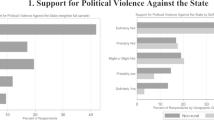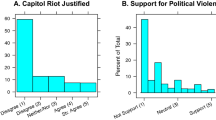Abstract
The politicization of the state is a relevant feature of contemporary democracies. At the analytical level, the article contributes to the study of patterns of politicization of the state, distinguishing the concept of patronage from other notions of political particularism often used synonymously in the literature. At the empirical level, the article examines patronage practices in contemporary Italy. It is part of a cross-national qualitative survey that allows the contextualization of the Italian case within a wider set of 15 European democracies for which aggregate comparative data will be presented. The empirical analysis identifies the causal mechanisms that explain why Italy still displays high, albeit decreasing, levels of politicization of the state.






Similar content being viewed by others
Notes
However, the persistence of patronage as a clientelistic exchange in Southern regions cannot compensate for the fall in the depth of party colonization within central disaggregated bodies.
It must be noted that this hypothesis is confirmed only with respect to the distribution of public sector jobs as one of the most relevant clientelistic exchanges. Further research is needed to empirically assess the decline of clientelistic exchanges based on selective benefits other than public jobs.
References
Bearfield, D.A. (2009) What is patronage? A critical reexamination. Public Administration Review 69 (1): 64–76.
Blondel, J. (2002) Party government, patronage, and party decline in Western Europe. In: R. Gunther, J.R. Montero and J.J. Linz (eds.) Political Parties: Old Concepts and New Challenges. Oxford: Oxford University Press.
Cassese, S. (1999) Italy's senior civil service: An ossified world. In: E.C. Page and V. Wright (eds.) Bureaucratic Elites in Western European States: A Comparative Analysis of Top Officials in Eleven Countries. Oxford: Oxford University Press.
D'Alimonte, R. (2005) Italy: A case of fragmented bipolarism. In: M. Gallagher and P. Mitchell (eds.) The Politics of Electoral Systems. Oxford: Oxford University Press.
Della Porta, D. and Vannucci, A. (2007) Mani impunite: Vecchia e nuova corruzione in Italia. Roma-Bari: Laterza.
Flinders, M. (2009) The politics of patronage in the UK: Shrinking reach and diluted permeation. Governance 22 (4): 547–570.
Forestiere, C. (2009) Kirchheimer Italian style: Catch-all parties or catch-all blocs? Party Politics 15 (5): 573–591.
Gingerich,, D.W. (2004) On unstable ground: parties, patronage and political corruption in contemporary Bolivia. Paper prepared for delivery at the Annual Meeting of the American Political Science Association, Chicago, IL.
Golden, M.A. (2003) Electoral connections: The effects of the personal vote on political patronage, bureaucracy and legislation in postwar Italy. British Journal of Political Science 33 (2): 189–212.
Grzymala-Busse, A. (2007) Rebuilding Leviathan: Party Competition and State Exploitation in Postcommunist Democracies. Cambridge: Cambridge University Press.
Hopkin, J. (2001) A ‘southern model’ of electoral mobilisation? Clientelism and electoral politics in Spain. West European Politics 24 (1): 115–136.
Jalali, C. (2007) Partidos e Democracia em Portugal, 1974–2005. Lisbon: ICS.
Katz, R. and Mair, P. (2009) The cartel thesis: A restatement. Perspectives on Politics 7 (4): 753–766.
Kitschelt, H. (2007) The demise of clientelism in affluent capitalist democracies. In: H. Kitschelt and S. Wilkinson (eds.) Patrons, Clients, or Policies? Patterns of Democratic Accountability and Political Competition. Cambridge: Cambridge University Press.
Kitschelt, H., Mansfeldova, Z., Markowski, R. and Toka, G. (1999) Post-communist Party Systems: Competition, Representation and Inter-party Cooperation. Cambridge: Cambridge University Press.
Kitschelt, H. and Wilkinson, S. (eds.) (2007) Citizen-politician linkages: An introduction. In: Patrons, Clients, or Policies? Patterns of Democratic Accountability and Political Competition. Cambridge: Cambridge University Press.
Kopecky, P., Mair, P. and Spirova, M. (eds.) (2011) Party Patronage and Party Government: Public Appointments and Political Control in European Democracies. Oxford: Oxford University Press.
Kopecky, P. and Scherlis, G. (2008) Party patronage in contemporary Europe. European Review 16 (3): 355–371.
Kopecky, P., Scherlis, G. and Spirova, M. (2008) Conceptualizing and Measuring Party Patronage. Working Paper No. 25, IPSA Committee on Concept & Methods, Mexico City.
Kopecky, P. and Spirova, M. (2010) Exploiting the state: Patterns of party patronage in the post-communist Europe. Paper prepared for delivery at the Political Studies Association Annual Conference, Edinburgh, UK.
Lande, C.H. (1983) Political clientelism in political studies: Retrospect and prospects. International Political Science Review 4 (4): 435–452.
Lewanski, R. (1999) Italian administration in transition. South European Society & Politics 4 (1): 97–131.
Lyrintzis, C. (1984) Political parties in post-junta Greece: A case of bureaucratic clientelism? West European Politics 7 (2): 99–118.
Mainwaring, S. (1999) Rethinking Party Systems in the Third Wave of Democratization: The Case of Brazil. Stanford, CA: Stanford University Press.
Mayntz, R. and Derlien, H.U. (1989) Party patronage and politicization of the West German administrative elite 1970–1987 – Toward hybridization? Governance 2 (4): 384–404.
Meyer-Sahling, J.H. (2008) The changing colours of the post-communist state: The politicisation of the senior civil service in Hungary. European Journal of Political Research 47 (1): 1–33.
Morlino, L. (1996) Crisis of parties and change of party system in Italy. Party Politics 2 (1): 5–30.
Morlino, L. (1998) Democracy between Consolidation and Crisis. Parties, Groups, and Citizens in Southern Europe. Oxford: Oxford University Press.
Morlino, L. and Tarchi, M. (1996) The dissatisfied society: The roots of political change in Italy. European Journal of Political Research 30 (1): 41–63.
Müller, W.C. (2006) Party patronage and party colonization of the state. In: R.S. Katz and W.J. Crotty (eds.) Handbook of Party Politics. London: Sage.
Müller, W.C. and Fallend, F. (2004) Changing patterns of party competition in Austria: From multipolar to bipolar system. West European Politics 27 (5): 801–835.
O'Dwyer, C. (2006) Runaway State-building: Patronage Politics and Democratic Development. Baltimore, MD: The Johns Hopkins University Press.
Pappas, T. (2010) Macroeconomic policy, strategic leadership, and voter behaviour: The disparate tales of socialist reformism in Greece and Spain during the 1980s. West European Politics 33 (6): 1241–1260.
Pasquino, G. (1989) Unregulated regulators: Parties and party government. In: P. Lange and M. Regini (eds.) State, Market, and Social Regulation: New Perspectives on Italy. Cambridge: Cambridge University Press.
Pasquino, G. (1997) No longer a party state? Institutions, power and the problems of Italian reform. West European Politics 20 (1): 34–53.
Peters, B.G. and Pierre, J. (eds.) (2004) The Politicization of the Civil Service in Comparative Perspective: The Quest for Control. London: Routledge.
Piattoni, S. (ed.) (2001) Clientelism in historical and comparative perspective. In: Clientelism, Interests, and Democratic Representation: The European Experience in Historical and Comparative Perspective. Cambridge: Cambridge University Press.
Radaelli, C. (2002) The Italian state and the euro: Institutions, discourse, and policy regimes. In: K. Dyson (ed.) European States and the Euro. Europeanization, Variation and Convergence. Oxford: Oxford University Press.
Rose, R. and Munro, N. (2009) Parties and Elections in New Democracies. Colchester, UK: ECPR Press.
Sartori, G. (1976) Parties and Party Systems: A Framework for Analysis. Cambridge: Cambridge University Press.
Shefter, M. (1977) Party and patronage: Germany, England and Italy. Politics and Society 7 (4): 403–452.
Sotiropoulos, D. (2004) Southern European public bureaucracies in comparative perspective. West European Politics 27 (3): 405–422.
Stokes, S. (2007) Political clientelism. In: C. Boix and S. Stokes (eds.) The Oxford Handbook of Comparative Politics. Oxford: Oxford University Press.
Tarrow, S. (1990) Maintaining hegemony in Italy: The softer they rise, the slower they fall! In: T.J. Pempel (ed.) Uncommon Democracies: The One Party Dominant Regimes. Ithaca, NY: Cornell University Press.
Treib, O. (2011) Party patronage in Austria. In: P. Kopecky P. Mair and M. Spirova (eds) Party Patronage and Party Government. Oxford: Oxford University Press.
Webb, P. and White, S. (eds.) (2007) Political parties in new democracies: Trajectories of development and implications for democracy. In: Party Politics in New Democracies. Oxford: Oxford University Press.
Weingrod, A. (1968) Patrons, patronage, and political parties. Comparative Studies in Society and History 10 (4): 377–400.
Acknowledgements
The author thanks Petr Kopecky, Peter Mair, Maria Spirova and all the members of the University of Leiden/European University Institute-coordinated ‘Patronage and Political Parties’ comparative research project.
Author information
Authors and Affiliations
Rights and permissions
About this article
Cite this article
Di Mascio, F. Changing political parties, persistent patronage: The Italian case in comparative perspective. Comp Eur Polit 10, 377–398 (2012). https://doi.org/10.1057/cep.2011.4
Published:
Issue Date:
DOI: https://doi.org/10.1057/cep.2011.4




